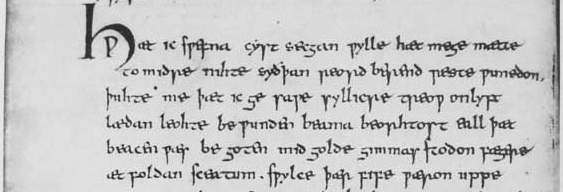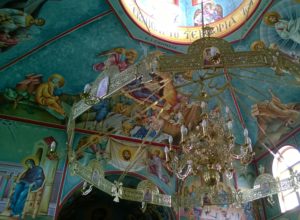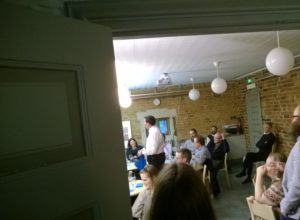

The opening lines of the “Rood” from the Vercelli manuscript
Modern Heretics
Like many things, my setting of the Anglo-Saxon poem, the “Dream of the Rood”, began as part of a long intellectual and spiritual journey. In my field of modern and experimental art music, every composer is searching for a unique voice, a signature in their musical style that lets them stand above the crowd. Often, this takes the form of a rebellion or a rejection of establishment ideas. Many of the famous composers of the twentieth century prided themselves on being cultural heretics, railing against mainstream culture. If their art and music disgusted the average person on the street, or horrified them, or confused them, all the better! Contempt for religion, business and entrepreneurship, traditional morals and ideals, mainstream entertainment, and the very idea of normal was rampant. Ironically, by the end of the twentieth century, many major composers had enthusiastically embraced these new ideas, making their rebellion and contempt for the average person the new normal.
My Rebellion
My instinct was always that if I were also to rebel, it would be against this new dogma. The nature of my rejection, though, wasn’t obvious. I did not want to abandon the project of modernism in its entirety – I thought it had many useful contributions. No other artistic period has better been able to express the loneliness of the human condition, or its hopelessness, or the utter confusion and suffocating miscellany of our modern, digital world. Furthermore, no other period has been willing to acknowledge this. The art of the twentieth century was willing to confront the abyss of all our human fears, to look the monster square in the eyes. What this modern art lacked was an affirmative response to the abyss. I believed that within the heart of Christianity, that is, Christ Himself, there was an answer. In school I was mastering the use of all the tools and techniques of modernism, but in private I was searching the corpus of human wisdom God had imparted to us throughout our history.
Finding the “Rood”
I stumbled upon some writings in Middle English (the English spoken before Shakespeare; contemporary with something like Geoffrey Chaucer’s Canterbury Tales) that I found intriguing, and they drove me to look back further, to the Old English body of work written before the year 1066. Among those works, including the famous epic Beowulf, was a short religious poem named “The Dream of the Rood” that caught my fancy. After reading it for the first time in modern English, I knew I wanted to set it to music and capture something of the fire of its poetic beauty and faith.
0


Pingback: 2 – A Dialogue with the Cross of Christ | Neuestalgia()